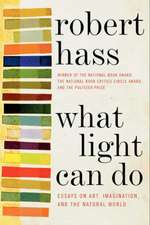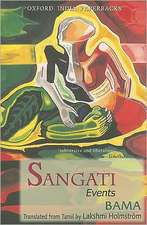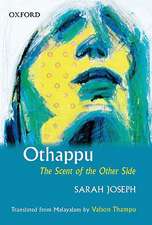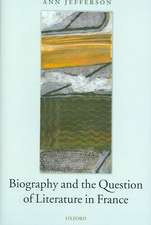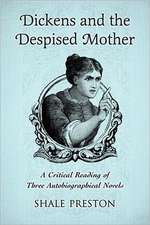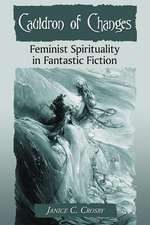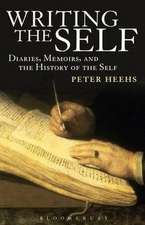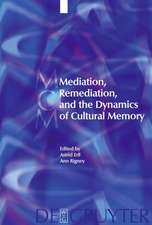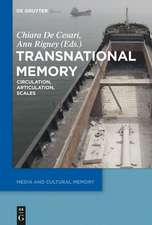The Afterlives of Walter Scott: Memory on the Move
Autor Ann Rigneyen Limba Engleză Hardback – 8 mar 2012
| Toate formatele și edițiile | Preț | Express |
|---|---|---|
| Paperback (1) | 265.23 lei 31-37 zile | |
| OUP OXFORD – 6 iul 2017 | 265.23 lei 31-37 zile | |
| Hardback (1) | 833.47 lei 31-37 zile | |
| Oxford University Press – 8 mar 2012 | 833.47 lei 31-37 zile |
Preț: 833.47 lei
Preț vechi: 1113.63 lei
-25% Nou
Puncte Express: 1250
Preț estimativ în valută:
159.48€ • 166.51$ • 131.99£
159.48€ • 166.51$ • 131.99£
Carte tipărită la comandă
Livrare economică 25-31 martie
Preluare comenzi: 021 569.72.76
Specificații
ISBN-13: 9780199644018
ISBN-10: 0199644012
Pagini: 348
Ilustrații: Numerous black-and-white halftones
Dimensiuni: 145 x 222 x 25 mm
Greutate: 0.59 kg
Editura: Oxford University Press
Colecția OUP Oxford
Locul publicării:Oxford, United Kingdom
ISBN-10: 0199644012
Pagini: 348
Ilustrații: Numerous black-and-white halftones
Dimensiuni: 145 x 222 x 25 mm
Greutate: 0.59 kg
Editura: Oxford University Press
Colecția OUP Oxford
Locul publicării:Oxford, United Kingdom
Recenzii
[This book shows] that scholarly interest in Scottish literature of this period is both alive and of a very high standard, illustrated by the quality of the writing itself, by the careful, extensive and well-documented notes, and the comprehensive bibliographies.
Rigney's lucid, intelligent, well-researched book deserves the widest possible audience not only for what it tells us about the fate of Scott's fictions and influence, but also for what it teaches us about the intricate dance of cultural remembering and forgetting.
Rigney's book is full of complex concepts, sharp phrases and original approaches.
a highly original contribution ... Rigneyâs work may prove procreative like Scottâs, fertile in inspiring future works.
a valuable extension of recent scholarship on the role of Scott's fiction in the development of the nation state and modernity
Rigney explores the "cultural importance and excitement generated by [Scott's] work" ... At its heart this book is a study of memory and forgetting.
As its title promises, this book advances the fields of literary reception, cultural memory, and poetic afterlife. Rarely have I so enjoyed a work of scholarship. Much of the book's appeal comes from its cogent analysis of surprising materials ... With erudition and extensive research ... it offers tools for analyzing the long-term reception of many books and authors.
[a] thoughtful and thought-provoking book ... most useful for those reading her book are the instruments she uses - and how one can borrow and make use of them oneself. Particularly eye-opening (for me, at least) is the wholly persuasive last chapter ("How Long was Immortality?") and her argument that by historicizing the present - where we are - Scott opened the way for modernism and set up the constantly renovating processes ("make it new", as Pound instructed) which ensured his (Scott's) own inevitable eclipse. Scott's genius was to dig his own grave - but, mysteriously and manifestly, as Rigney shows, live on
This is an outstanding book which deftly shows the limitations of insistent disciplinary overreliance on text at the expense of considering its mediations. ... Rigney's book is full of complex concepts, sharp phrases and original approaches.
Rigney's lucid, intelligent, well-researched book deserves the widest possible audience not only for what it tells us about the fate of Scott's fictions and influence, but also for what it teaches us about the intricate dance of cultural remembering and forgetting.
Rigney's book is full of complex concepts, sharp phrases and original approaches.
a highly original contribution ... Rigneyâs work may prove procreative like Scottâs, fertile in inspiring future works.
a valuable extension of recent scholarship on the role of Scott's fiction in the development of the nation state and modernity
Rigney explores the "cultural importance and excitement generated by [Scott's] work" ... At its heart this book is a study of memory and forgetting.
As its title promises, this book advances the fields of literary reception, cultural memory, and poetic afterlife. Rarely have I so enjoyed a work of scholarship. Much of the book's appeal comes from its cogent analysis of surprising materials ... With erudition and extensive research ... it offers tools for analyzing the long-term reception of many books and authors.
[a] thoughtful and thought-provoking book ... most useful for those reading her book are the instruments she uses - and how one can borrow and make use of them oneself. Particularly eye-opening (for me, at least) is the wholly persuasive last chapter ("How Long was Immortality?") and her argument that by historicizing the present - where we are - Scott opened the way for modernism and set up the constantly renovating processes ("make it new", as Pound instructed) which ensured his (Scott's) own inevitable eclipse. Scott's genius was to dig his own grave - but, mysteriously and manifestly, as Rigney shows, live on
This is an outstanding book which deftly shows the limitations of insistent disciplinary overreliance on text at the expense of considering its mediations. ... Rigney's book is full of complex concepts, sharp phrases and original approaches.
Notă biografică
Ann Rigney was born in Dublin, educated at University College Dublin and the University of Toronto, and is currently professor of Comparative Literature at Utrecht University. She was elected a member of the Royal Netherlands Academy of Sciences in 2005. She has published widely in the field of cultural memory, philosophy of history, and nineteenth-century historiography. Her books include The Rhetoric of Historical Representation: Three Narrative Histories of the French Revolution (Cambridge UP, 1990) and Imperfect Histories: The Elusive Past and the Legacy of Romantic Historicism (Cornell UP, 2011).

